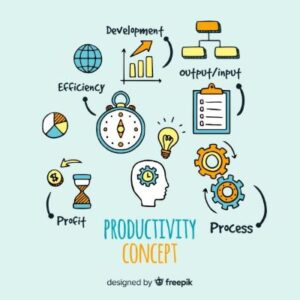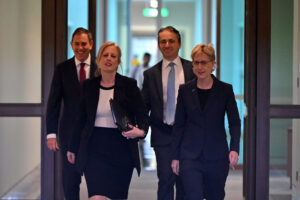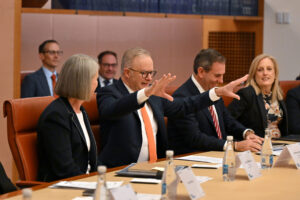US professor and activist Noam Chomsky used to always advise people who wanted to know the truth to read the business press, because their readers needed to know what was really going on.
It remains true. And that’s how we know business is very worried about the productivity roundtable Jim Chalmers has called for later this month.
Back in 2020, when the pandemic had all elements of Australia’s industrial relations sector in a panic, the emphasis was on the ACTU and business working together.
Countless op-eds were written about how union boss Sally McManus and the Coalition’s then-IR minister Christian Porter worked to find elements of consensus in how to address the looming crisis.
“No time for a workplace brawl”, advised the Australian Financial Review. That push for consensus continued into 2022 when Labor held its Jobs Summit, with the Business Council of Australia and the ACTU jointly releasing “shared principles and policy suggestions” ahead of the talkfest, as if laying the groundwork for the shared interest would make disagreeing later easier.
It didn’t. And getting along doesn’t mean good policy. Usually it just dulls any progressive push for structural change.
Which is why the immediate pushback against the ACTU’s call for a 25 per cent tax on revenue from gas exports in place of the flawed Petroleum Resource Rent Tax (PRRT), a minimum 25 per cent tax rate on family trusts and individuals earning more than $1 million a year, changes to negative gearing and capital gains tax concessions and caps to the diesel fuel rebate very telling.
Just last week, buried in the bottom half of one of its productivity stories, the Fin reported wealth taxes were actually quite popular with voters.
The AFR reported polling by SEC Newgate Research found almost two-thirds of voters would “support income tax cuts funded by higher taxes on wealth, and increased taxes on landlords with multiple investment properties”.
In the bottom half of a different story, the AFR quoted an anonymous government source who “acknowledged third-party support at the summit for higher wealth taxes would ease the politics around the bill, more so if it was accompanied by other tax increases”.
McManus came out on Sunday arguing for change and now wealth taxes are firmly in the public consciousness. As is the pushback.
But if the arguments against changing something as simple as negative gearing, by grandfathering it for five years, are as self-serving as leading to “a fire sale” in the fifth year, then that is as flimsy as an unregulated build.
It’s like claiming that giving a deadline means that everyone will wait until the last moment to do their assignment – and then the loss of credit is the fault of the deadline, rather than the lack of preparation ahead of it.
And Labor doesn’t need to look too far for evidence the policies aren’t election killers – particularly among those who may be the most impacted by any change. (Not that it matters in this electoral environment.)
The party’s own review into its failed 2019 election campaign found that high-income voters swung towards Labor – the average swing towards Labor in the 20 seats with the highest university graduates was 3.78 per cent.
Then Labor was undone by the average swing against it in the seats with the lowest representation of university graduates (-4.22 per cent).
The review found that voters most likely to be impacted by the franking credits policy voted for Labor, while those least likely to be affected voted against it, influenced by the targeted Liberal campaign.
The gains in those seats helped pave the way for the Teal wave that crashed over the inner-city Liberal seats in 2022 and largely held in 2025.
The Liberals are completely irrelevant this time around. Labor doesn’t need to win an electorate, or even the support of business. It just needs to hold the line for the need for real, systemic change, and win the information battle.
That’s difficult when this country has largely operated on the idea that if you want to help the manufacturing industry, you need to first give the gas industry whatever it wants, and to help people get in to housing, you must kowtow to property developers.
The issue Jim Chalmers and the government face with the productivity summit is not a lack of ideas (and ideas that would work, at that) but fighting the centrist push for consensus.
Vested interests will never agree with changes that upset their own apple carts. But if it means the apples are better distributed, then the people will.
Between the Lines Newsletter
The biggest stories and the best analysis from the team at the Australia Institute, delivered to your inbox every fortnight.
You might also like
Productivity is often mistaken for wages. What does it really mean? How does it work?
Australia’s productivity growth has reverted to the same stagnant pattern as before the pandemic, according to the Productivity Commission’s latest quarterly report. Productivity is complex and often misunderstood in media and policy debates. So before we read too much into this latest data, here are six key things to understand about productivity. 1. It’s about quantities,
Australia’s capital class remains too focused on profit to truly address productivity
A key problem with the economic roundtable is many of those hauled in to fix Australia’s productivity black hole have spent the past 25 years gunning for more privatisation.
Economic round table recycles broken ideas
A genuine debate about how to boost Australia’s productivity should bring in a wide range of groups to talk about a wide range of options, but, alas, that’s not what happened in Canberra last week.




